Many people take a daily fiber supplement because it can help manage weight, decrease appetite, reduce risk for chronic disease, and improve gastrointestinal health.
Increasing your dietary fiber also facilitates a smoother digestion process.
Fiber supplements are cheap, easy to use, and widely available. Here are the best ones, ranked.
1. Viva Naturals Organic Psyllium Husks
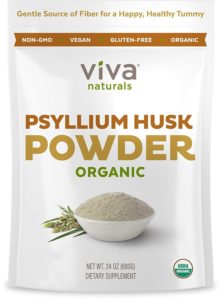
Click here for the lowest price on Amazon
Viva Naturals has made a name for itself delivering simple, no-nonsense basic supplements for a great price, and their psyllium husk fiber supplement is no exception. No flavorings, no additives, and a phenomenal price per serving make this an excellent choice for a powder based fiber supplement. And to top it all off, it’s certified organic!
This is good news if you want to cut down on the number of unnecessary pesticides and herbicides that make their way into your food and supplements. When it’s this easy and cheap to go organic, it’s a no-brainer.
2. Garden of Life Raw Fiber
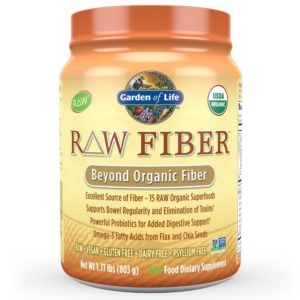
Click here for the lowest price on Amazon
Garden of Life always has a unique take on a given supplement. While most other companies focus on sourcing one type of fiber, Garden of Life’s Raw Fiber supplement includes over a dozen different sources of fiber, including quinoa, chia seeds, coconut fiber, pumpkin seeds, and more.
These are sweetened with Stevia, which, although it is a naturally-derived non-caloric sweetener, may not be up your alley. To top it all off, Garden of Life includes a hefty serving of Bacillus coagulans probiotic bacteria. If you want a “maximalist” fiber supplement that’s still certified organic, look no further.
3. Optimum Nutrition Fitness Fiber
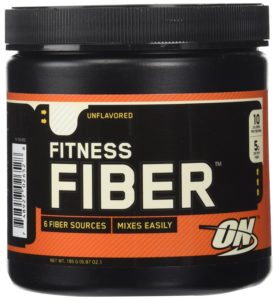
Click here for the lowest price on Amazon
Though this company is better known for its whey protein and pre-workout supplements, it does make a fiber (with an obvious workout-based bent). Despite the fact that there isn’t much “fitness” about its formulation, Optimum Nutrition does take an interesting angle on their fiber supplement.
It includes a blend of seven different forms of fiber, presumably to provide you with a good mix of soluble and insoluble fiber. It’s totally unflavored, so it will be a little chalky and dry if you drink it straight up, but it’s perfect for mixing into a protein shake or a smoothie. Finally, the price is great.
4. Benefiber
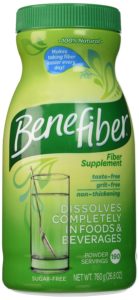
Click here for the lowest price on Amazon
Benefiber is a big hitter when it comes to popularity, but it’s not actually the best-selling fiber supplement out there. For its fiber base it uses wheat dextrin, which is processed to remove as much gluten as possible. It’s certified to contain less than 20 parts per million of gluten, which qualifies it for the label of “gluten free.”
If you have a wheat allergy, or have particularly sensitive celiac disease, you might consider a non-wheat based fiber despite this certification. It’s unflavored and unsweetened, which can be a good or bad thing depending on your preferences. Benefiber is often lauded for its ability to mix into baked goods and prepared foods to up their fiber content, as it doesn’t cause most liquids to clump up.
5. Manitoba Harvest Hemp Pro Fiber
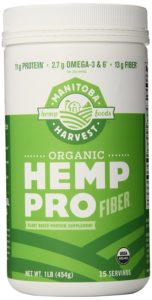
Click here for the lowest price on Amazon
Manitoba Harvest offers an interesting combo of protein and fiber with just one ingredient. As it turns out, raw milled hemp protein has nearly equal protein and fiber content: one scoop of the loose powder provides 11 grams of protein, 13 grams of fiber, and a tremendous amount of omega 3, omega 6, and omega 9 fatty acids.
With its low price, it’s a cost-effective option too. With no real detriments and a lot of major advantages, Manitoba Harvest Hemp Pro Powder finds its way near the top.
6. Sunergetic Psyllium Husk
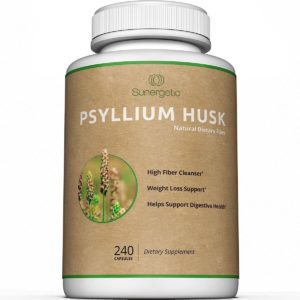
Click here for the lowest price on Amazon
The bottle packaging alone tells you what this fiber supplement is all about. It’s a plain, simple, capsule-based fiber supplement that provides a respectable 725 mg of fiber per capsule. It includes a few binders and anti-clumping agents, and notably, the capsules are made of gelatin, so this supplement is not suitable for vegetarians or vegans.
However, it’s a fairly cost-effective capsule based supplement if you don’t need to dramatically up your fiber intake. With 240 capsules per bottle, you could add over five grams of fiber to your dietary intake per day and the bottle would last you over a month. Of course, you’d be downing seven pills a day, so if you need a massive boost in fiber intake, look for a powder-based supplement if you can stomach the taste.
7. Now Psyllium Husk Caps
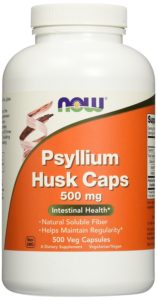
Click here for the lowest price on Amazon
If you hate the taste of fiber (and really, who doesn’t?) taking it in a capsule form is a nice alternative. Now Psyllium Husk Caps are a perfect options for a pill-based fiber supplement. The fiber is plant-derived and bound up with cellulose and stearic acid (derived from vegetable sources, so no problems for vegetarians and vegans) and delivers 1.1 grams of fiber (most of it soluble fiber) per three-capsule serving.
This is the main downside of capsule based fiber supplements: you have to down a lot of them to get your fiber intake up. Given that the recommended daily intake for fiber for optimal health is 25-38 grams per day (1), you’re going to go through a lot of pills if your fiber intake is low.
8. Metamucil Daily Fiber
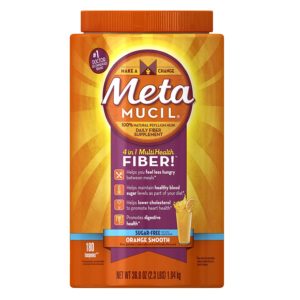
Click here for the lowest price on Amazon
As seen on TV, the most-recognized fiber brand has made a few tough choices to broaden its appeal. The classic Metamucil comes as psyllium husk powder, which is great if you really need to crank up your fiber intake. One container provides over 1,000 grams of fiber, which is enough for a month of use even if you got no additional fiber in your diet.
Metamucil is cheap, works well, and will last a long time. However, it is flavored and colored, so if that’s not your preference, look elsewhere. It uses both natural and artificial flavoring, as well as the artificial sweetener aspartame and the coloring agent Yellow 6. There are plenty of reasons to avoid ingredients like this if you are health conscious.
9. Phillips Fiber Good Gummies

Click here for the lowest price on Amazon
For those who really hate the taste and texture of fiber, and can’t handle capsules either, these gummies are one possible solution. They pack a surprising punch: each gummy contains 2 grams of soluble fiber, which is pretty good for a pill-based fiber product.
One drawback is simply package size: a bottle only contains 90 gummies. They are colored and flavored with natural products only, which is nice if you are trying to avoid artificial ingredients in your supplements.
10. Fiber Choice Prebiotic
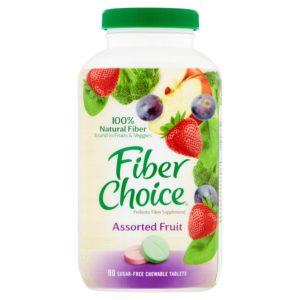
Click here for the lowest price on Amazon
Fiber Choice is the polar opposite of the minimalist fiber supplements. It’s a flavored, sweetened, chewable fiber supplement, which might not be your cup of tea. The ingredients list is awfully long, especially considering that many other fiber supplements just have one ingredient.
It’s a laundry list of questionable ingredients, including artificial flavors, Red 40, Blue 2, Blue 1, and Yellow 5. The colorful tablets and fruity flavors make it obvious that this is marketed as a kid-friendly fiber supplement, but would you really want your kids eating all of those artificial additives? Only if they (or you) can’t stomach the chalky taste of most other fiber supplements, and don’t like swallowing pills.
Part Two: An in-depth look at fiber
Fiber is the indigestible carbohydrate content of food, and plays important roles in cultivating vibrant health, especially in our digestive system.
Nutritional experts are continually advising us to include more fiber in the diet. We’ve been told we don’t get enough (1), and eating more fiber is supposed to have benefits across the board, from preventing cancer and heart disease to lowering cholesterol levels.
Government recommendations say women should eat 25 grams of fiber daily, and men need more at 38 grams. (2)
Dietary fiber is an important part of a well-rounded eating plan, but the reasons for including plenty of high-fiber foods are more complex than you might think.
Two kinds of fiber are found in the foods we eat; water-soluble fiber obviously dissolves in water, and insoluble fiber does not. Soluble fiber is digested by bacteria in the gut, and this process has a number of beneficial effects on the system. (3)
The soluble fiber found in foods like nuts, seeds, oat bran, lentils, beans and certain fruits and vegetables attracts water and turns to a gel, slowing digestion. The insoluble fiber found in foods like whole grains and vegetables bulks up the stool, and may help foods pass through the digestive system more quickly. (4)
A Symbiotic Relationship: Fiber and Gut Bacteria
Each of us has around a hundred trillion gut flora living in our digestive tract, ten times as many as the number of cells in our bodies. Gut flora enjoy a safe environment, and in turn, perform services for the body it can’t do on its own.
These bacteria affect everything from brain function and immune response to blood sugar and weight. (5, 6, 7, 8)
Since most nutrients are absorbed into the bloodstream quickly, intestinal bacteria are last in line to get the goodies from food we eat. Gut bacteria have the ability to digest fiber, so when the fiber from our diets finally makes it to the large intestine, they go to work digesting what’s been moved along mostly unchanged up to that point.
Prebiotics are a byproduct of this digestion, which increases what’s called the “friendly” bacteria population; when certain species of bacteria thrive in this inner environment, they can positively or negatively affect ratios of lean body mass to body fat. (9)
Butyrate is one of these byproducts, and has been associated with improved colon health. (10, 11) The short-chain fatty acids produced by the digestion of fiber appear to have positive influences on patients with Crohn’s disease and irritable bowel syndrome. (12)
Blood Sugar Regulation and Weight Control
Different kinds of fiber can have different effects on digestion, as well as on sensitive regulatory processes like blood sugar levels. High-fiber foods are usually lower on the glycemic index, so even vegetables high in natural sugars like sweet potatoes, carrots, parsnips, and beets don’t cause significant spikes in blood sugar because it takes longer to digest them. (13)
Low-fiber foods are often higher on the glycemic index, which can cause problems for diabetics and others who want to avoid the harmful effects of blood sugar spikes.
Foods high in fiber take up more space in the stomach, causing a feeling of satiation, which sends the signal to stop eating. The obvious result of this effect is that a focus on high-fiber foods in the diet may result in a lower overall intake of calories.
In one recent study, women were randomly assigned to follow two diets; one was a standard low-fat diet, and the other diet allowed the consumption of as many high water content fruits and vegetables as the subjects desired.
Both groups lost weight: about 14 pounds average for the low fat group, and 17 pounds for women who ate their fill of added foods, all of which were rich in fiber. The women eating plenty of fruits and veggies ate more food by volume, but consumed fewer total calories. They never felt hungry. (14)
Glucomannan, a water soluble fiber supplement derived from the elephant yam, has shown promise as an effective weight-loss supplement. This super-fiber will absorb 50 times its own weight in water, so when taken before a meal with a glass of water, it puffs up in the stomach, creating a full feeling.
Weight-loss supplements made with glucomannan were tested during a 5-week trial with 176 overweight subjects who followed a low-calorie diet. Results were compared to a control group taking placebos, and those who used the supplement dropped up to 6 more pounds than the control group. (15)
Including plenty of dietary fiber in meals also prolongs the sensation of fullness, which can be helpful in achieving weight-loss goals. (16)
Scientists continue to study the data, but it also appears an abundance of friendly gut bacteria is associated with a leaner Body Mass Index (BMI). (17)
Preventing Chronic Diseases
Fiber can positively affect cholesterol levels and other vital health markers. (18)
Research suggests that eating more fiber may be a contributing factor to why plant-based diets have been successful in dropping cholesterol levels, as well as triglyceride measurements and blood pressure. These conditions jack up the risk of coronary heart disease, so upping fiber intake may be useful in treating patients at high risk for cardiovascular problems. (19)
The World Cancer Research Center recommends a plant based diet for decreasing the risk of developing cancer, noting that high fiber intake is especially important in preventing bowel cancer. (20)
Adequate dietary fiber has been associated with a reduction in the risk of developing cardiovascular disease. (21) A study report issued by the National Institutes of Health tracked the health and dietary habits of 50,000 men and women in Japan over 14 years; those who consistently included more fiber in their diets had a lower incidence of cardiovascular disease. (22)
Recap
Fiber feeds friendly bacteria in the gut that help keep everything functioning smoothly as digestion processes take place. While this may be part of the reason why eating a high-fiber diet appears to be a healthy choice, many other factors are involved. It may take many years and numerous studies to ferret out the particulars.
Summary: Whatever the details, it looks like a smart bet to keep those high-fiber foods on your plate or take a fiber supplement.
https://bodynutrition.org/fiber/ http://bodynutritionorg.tumblr.com/post/164533578429

No comments:
Post a Comment